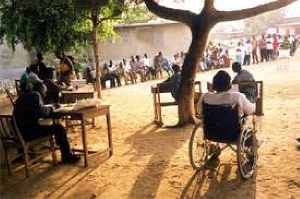 Yakor-Dagbah said historically PWDs had been denied fundamental human and civil rights
Yakor-Dagbah said historically PWDs had been denied fundamental human and civil rights
When justice is inaccessible, the result is injustice, Madam Mawunyor Yakor-Dagbah, National Vice President, Ghana Federation for the Disability Organisations, has stated.
She said: “Injustice leads to bitterness, anger, revolt and ultimately political and social disintegration. In this regard, there is a real, compelling and immediate need to eliminate barriers to access to justice for persons with disabilities”.
She said it was time to take stock of the scope of the right to access to justice for persons with disabilities; barriers to access to justice for persons with disabilities; and solutions to overcome the barriers to access to justice.
Madam Yakor-Dagbah said this at the opening ceremony of weeklong course on Access to Justice for PWDs at the Faculty of Law, University of Ghana (UG) in Accra.
The course, which was opened by Madam Otiko
Afiah Djaba, the Minister of Gender, Children and Social Protection, is being organised by the Faculty of Law, UG, in collaboration with Opened Society Initiative for West Africa (OSIWA).
PWDs continue to be excluded from effective participation in justice delivery through two main obstacles expressed in the normative framework which provide the recognition of the rights of PWDs – and the institutional framework, which deals with law enforcement and the court systems.
These frameworks translate into access to the law; participation in the justice system as well as legal education and training.
In light of the above, the course aims at adopting a right-based approach to improve the inclusivity and provide comprehensive access to justice for PWDs, either as direct or indirect participants and whether as victims of crime, suspects, witnesses, plaintiffs, defendants, appellants, remand prisoners or prison inmates.
She lauded OSIWA for its unfaltering commitment to the rights of persons with disabilities.
She said according to the World Report on Disability, approximately 15 per cent of the global population, experience some form of disability.
She explained that the sad truth however, was that PWDs face marginalisation in many socio-economic respects, resulting in lower quality of education, limited employment prospects, poor health and restrictions to community participation.
“These negative outcomes are exacerbated by barriers to access to justice they experience. Meanwhile, access to justice is crucial for PWDs and serves as a tool to counter the discrimination that they face. Paradoxically, however, those who need effective access to justice most are the ones most frequently encountering barriers to it,” she said.
Madam Yakor-Dagbah said historically PWDs had been denied fundamental human and civil rights.
She said many barriers hinder their full and effective access to justice on an equal basis with others; adding that “PWDs face economic, social, cultural, and attitudinal barriers in their quest to access justice”.
She said there was limited or no knowledge about legal rights and entitlements; declaring that “there is no effective access to inexpensive social services, we have weak and inadequate legal aid to make justice accessible to PWDs, high and prohibitive legal costs”.
“We also experience inaccessible environments, information, communication and services and discriminatory practices. PWDs with cognitive disabilities may have more difficulty with long term memory or remembering the sequence of events, which may make them appear less credible,” Madam Yakor-Dagbah said.
She said the problems of access to justice faced by PWDs were associated with poverty and the lack of enforcement of social, economic and cultural rights.
She said PWDs need to be empowered with knowledge of their rights and legal awareness, to entitle them to lodge complaints against abuses of rights and seek redress.
“In other situations persons with disabilities are aware that their right are sometimes violated, but there are no known available channels that they can use to seek justice,” Madam Yakor-Dagbah said.
“It is therefore, necessary to facilitate: Legal awareness and rights dissemination among persons with disabilities; Provide legal representation for the persons with disabilities; and Facilitate access to justice service for them.”
Ms Afia Asare-Kyei, Programme Manager, Law, Justice and Human Rights, OSIWA, urged people to desist from using words such as “disabled” or “handicapped” in referring to the physically challenged.
Ms Josephine Nkrumah, Chairman, National Commission for Civil Education (NCCE), who chaired the function, called for justice for all manner of persons in society.
“The journey to ensure that PWDs have access to justice must be free of all obstacles; whether by laws, practices, infrastructure; so that we together can realise the objective of access to justice without any forms of hindrance,” she said.